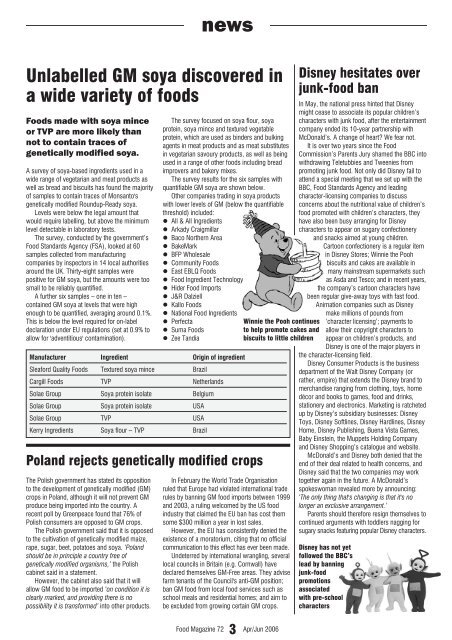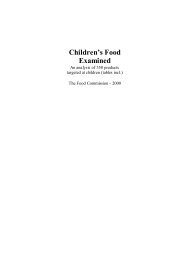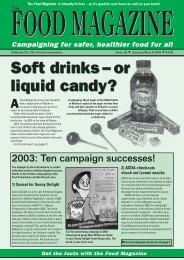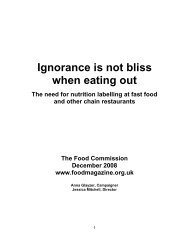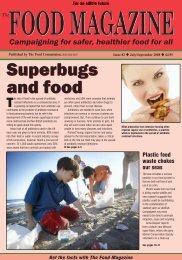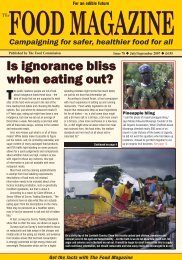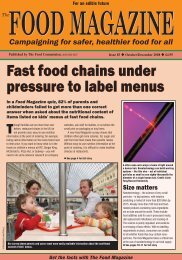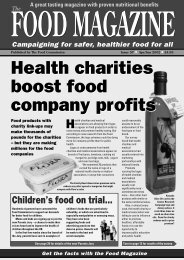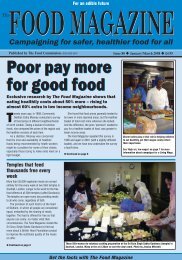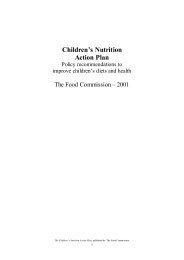Campaigning for safer, healthier food for all - The Food Commission
Campaigning for safer, healthier food for all - The Food Commission
Campaigning for safer, healthier food for all - The Food Commission
Create successful ePaper yourself
Turn your PDF publications into a flip-book with our unique Google optimized e-Paper software.
news<br />
Unlabelled GM soya discovered in<br />
a wide variety of <strong>food</strong>s<br />
<strong>Food</strong>s made with soya mince<br />
or TVP are more likely than<br />
not to contain traces of<br />
genetic<strong>all</strong>y modified soya.<br />
A survey of soya-based ingredients used in a<br />
wide range of vegetarian and meat products as<br />
well as bread and biscuits has found the majority<br />
of samples to contain traces of Monsanto's<br />
genetic<strong>all</strong>y modified Roundup-Ready soya.<br />
Levels were below the legal amount that<br />
would require labelling, but above the minimum<br />
level detectable in laboratory tests.<br />
<strong>The</strong> survey, conducted by the government’s<br />
<strong>Food</strong> Standards Agency (FSA), looked at 60<br />
samples collected from manufacturing<br />
companies by inspectors in 14 local authorities<br />
around the UK. Thirty-eight samples were<br />
positive <strong>for</strong> GM soya, but the amounts were too<br />
sm<strong>all</strong> to be reliably quantified.<br />
A further six samples – one in ten –<br />
contained GM soya at levels that were high<br />
enough to be quantified, averaging around 0.1%.<br />
This is below the level required <strong>for</strong> on-label<br />
declaration under EU regulations (set at 0.9% to<br />
<strong>all</strong>ow <strong>for</strong> 'adventitious' contamination).<br />
<strong>The</strong> survey focused on soya flour, soya<br />
protein, soya mince and textured vegetable<br />
protein, which are used as binders and bulking<br />
agents in meat products and as meat substitutes<br />
in vegetarian savoury products, as well as being<br />
used in a range of other <strong>food</strong>s including bread<br />
improvers and bakery mixes.<br />
<strong>The</strong> survey results <strong>for</strong> the six samples with<br />
quantifiable GM soya are shown below.<br />
Other companies trading in soya products<br />
with lower levels of GM (below the quantifiable<br />
threshold) included:<br />
All & All Ingredients<br />
Arkady Craigmillar<br />
Baco Northern Area<br />
BakeMark<br />
BFP Wholesale<br />
Community <strong>Food</strong>s<br />
East EBLQ <strong>Food</strong>s<br />
<strong>Food</strong> Ingredient Technology<br />
Hider <strong>Food</strong> Imports<br />
J&R Dalziell<br />
K<strong>all</strong>o <strong>Food</strong>s<br />
National <strong>Food</strong> Ingredients<br />
Perfecta<br />
Suma <strong>Food</strong>s<br />
Zee Tandia<br />
Manufacturer Ingredient Origin of ingredient<br />
Slea<strong>for</strong>d Quality <strong>Food</strong>s Textured soya mince Brazil<br />
Cargill <strong>Food</strong>s TVP Netherlands<br />
Solae Group Soya protein isolate Belgium<br />
Solae Group Soya protein isolate USA<br />
Solae Group TVP USA<br />
Kerry Ingredients Soya flour – TVP Brazil<br />
Poland rejects genetic<strong>all</strong>y modified crops<br />
<strong>The</strong> Polish government has stated its opposition<br />
to the development of genetic<strong>all</strong>y modified (GM)<br />
crops in Poland, although it will not prevent GM<br />
produce being imported into the country. A<br />
recent poll by Greenpeace found that 76% of<br />
Polish consumers are opposed to GM crops.<br />
<strong>The</strong> Polish government said that it is opposed<br />
to the cultivation of genetic<strong>all</strong>y modified maize,<br />
rape, sugar, beet, potatoes and soya. ‘Poland<br />
should be in principle a country free of<br />
genetic<strong>all</strong>y modified organisms,’ the Polish<br />
cabinet said in a statement.<br />
However, the cabinet also said that it will<br />
<strong>all</strong>ow GM <strong>food</strong> to be imported ‘on condition it is<br />
clearly marked, and providing there is no<br />
possibility it is trans<strong>for</strong>med’ into other products.<br />
Winnie the Pooh continues<br />
to help promote cakes and<br />
biscuits to little children<br />
In February the World Trade Organisation<br />
ruled that Europe had violated international trade<br />
rules by banning GM <strong>food</strong> imports between 1999<br />
and 2003, a ruling welcomed by the US <strong>food</strong><br />
industry that claimed the EU ban has cost them<br />
some $300 million a year in lost sales.<br />
However, the EU has consistently denied the<br />
existence of a moratorium, citing that no official<br />
communication to this effect has ever been made.<br />
Undeterred by international wrangling, several<br />
local councils in Britain (e.g. Cornw<strong>all</strong>) have<br />
declared themselves GM-Free areas. <strong>The</strong>y advise<br />
farm tenants of the Council's anti-GM position;<br />
ban GM <strong>food</strong> from local <strong>food</strong> services such as<br />
school meals and residential homes; and aim to<br />
be excluded from growing certain GM crops.<br />
Disney hesitates over<br />
junk-<strong>food</strong> ban<br />
In May, the national press hinted that Disney<br />
might cease to associate its popular children’s<br />
characters with junk <strong>food</strong>, after the entertainment<br />
company ended its 10-year partnership with<br />
McDonald’s. A change of heart? We fear not.<br />
It is over two years since the <strong>Food</strong><br />
<strong>Commission</strong>’s Parents Jury shamed the BBC into<br />
withdrawing Teletubbies and Tweenies from<br />
promoting junk <strong>food</strong>. Not only did Disney fail to<br />
attend a special meeting that we set up with the<br />
BBC, <strong>Food</strong> Standards Agency and leading<br />
character-licensing companies to discuss<br />
concerns about the nutritional value of children’s<br />
<strong>food</strong> promoted with children’s characters, they<br />
have also been busy arranging <strong>for</strong> Disney<br />
characters to appear on sugary confectionery<br />
and snacks aimed at young children.<br />
Cartoon confectionery is a regular item<br />
in Disney Stores; Winnie the Pooh<br />
biscuits and cakes are available in<br />
many mainstream supermarkets such<br />
as Asda and Tesco; and in recent years,<br />
the company’s cartoon characters have<br />
been regular give-away toys with fast <strong>food</strong>.<br />
Animation companies such as Disney<br />
make millions of pounds from<br />
‘character licensing’; payments to<br />
<strong>all</strong>ow their copyright characters to<br />
appear on children’s products, and<br />
Disney is one of the major players in<br />
the character-licensing field.<br />
Disney Consumer Products is the business<br />
department of the Walt Disney Company (or<br />
rather, empire) that extends the Disney brand to<br />
merchandise ranging from clothing, toys, home<br />
décor and books to games, <strong>food</strong> and drinks,<br />
stationery and electronics. Marketing is ratcheted<br />
up by Disney’s subsidiary businesses: Disney<br />
Toys, Disney Softlines, Disney Hardlines, Disney<br />
Home, Disney Publishing, Buena Vista Games,<br />
Baby Einstein, the Muppets Holding Company<br />
and Disney Shopping’s catalogue and website.<br />
McDonald’s and Disney both denied that the<br />
end of their deal related to health concerns, and<br />
Disney said that the two companies may work<br />
together again in the future. A McDonald’s<br />
spokeswoman revealed more by announcing:<br />
‘<strong>The</strong> only thing that's changing is that it's no<br />
longer an exclusive arrangement.’<br />
Parents should there<strong>for</strong>e resign themselves to<br />
continued arguments with toddlers nagging <strong>for</strong><br />
sugary snacks featuring popular Disney characters.<br />
Disney has not yet<br />
followed the BBC’s<br />
lead by banning<br />
junk-<strong>food</strong><br />
promotions<br />
associated<br />
with pre-school<br />
characters<br />
<strong>Food</strong> Magazine 72 3<br />
Apr/Jun 2006


